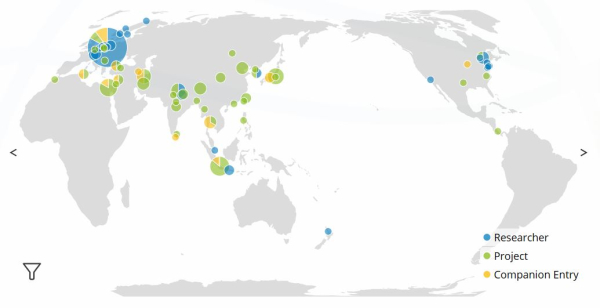|
If the newsletter does not display properly, please click here. |

|
|
|
|
Wow! |
|

|
|
|
Since a few days, an interactive world map on our homepage gives an overview of the researchers and projects of the research group as well as of the entries in the Companion to the Study of Secularity. The map can be rotated and zoomed to specific regions and the entries can be filtered by researcher, project, and companion entry, as well as by religious tradition, era, terms used, and societal realm, for which conceptual distinctions and structural differentiations are established and investigated. The map thus offers an intuitive introduction to the work of the research group and helps to navigate the website by interest. Please test the map, play with it and let us know what we can do better. For those who like the map and have fun visualising data, especially through maps, we recommend the homepage of our programmer and map nerd Torben Jansen. |
|

|
|
|
This week we welcome two scholars of Islam and Islamicate societies as new fellows in our research group: Gudrun Krämer from Freie Universität Berlin and Hans-Georg Ebert from Leipzig University. Over the next six months, Gudrun Krämer will be working on a project on “Islam, Modernity and secularity reconsidered. The case of Egypt” and Hans-Georg Ebert will deal with “Religious legal regulations and social challenges facing Islamic countries in land law: the waqf lands in the reform process”. We also welcome Japanologist Mark Mullins from the University of Auckland to our team. He will continue his research on "Competing notions of religion and secularity in occupied and post-war Japan" with us. |
|
New Companion Entries on Forms of Secularity in India and the Tibetan Cultural AreaOur Companion to the Study of Secularity has grown by two more contributions: Sushmita Nath’s contribution to “Narratives of Secularity in 20th-Century India” gives an overview of the various narratives of "secularity" in modern India, with a particular focus on the 20th century. It traces how 'secularity' in India developed in response to the country's religious pluralism, from British colonial rule to independence movement and the recent present. In her contribution "Buddhism and Politics in the Tibetan Cultural Area" Dagmar Schwerk deals with the major forms of Buddhist governance that have developed over time in the Tibetan cultural area since the introduction of Buddhism in the seventh century in Tibet. How have distinctions and differentiations between the societal spheres of religion and politics manifested themselves? Finally, which general Buddhist conceptions may be considered essential in the different forms of governance? This article provides a chronological overview of the major forms of Buddhist governments in the Tibetan cultural area while also touching on various underlying conceptions of Buddhist governance relevant to the process of conceptual distinction and social differentiation.
|
|

|
|
Follow us at academia.edu!For some time now, the Kolleg-Forschungsgruppe has had a profile on academia.edu, on which we publish, among other things, all working papers and entries to the Companion to the Study of Secularity, as well as information on events, calls, etc. in the future. Follow us and stay up to date automatically! |
|

|
|
"Festival of Lights" in remembrance of the Peaceful Revolution on 9 OctoberNext Wednesday, 9 October, the city will celebrate the 30th anniversary of the Peaceful Revolution with the "Festival of Lights". In the evening, light and video installations by the Austrian artist Victoria Coeln will be on display throughout the city centre and at various locations in Leipzig's inner city ring. On Augustusplatz, people are invited to light the "Leipzig 89" together with more than 25,000 candles. |
|
|
Kolleg-Forschungsgruppe "Multiple Secularities - Beyond the West, Beyond Modernities" Nikolaistraße 8-10, 04109 Leipzig Mail: multiple-secularities@uni-leipzig.de |